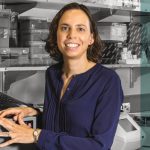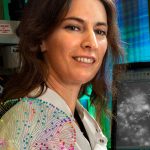As an active hiker, I often ponder the wondrous complexities of human locomotion— the seamless coordination between neural, muscular and skeletal systems that allows bipedal creatures to negotiate all sorts of uneven terrain. So it’s of special interest to read about the advances Salk professor Sam Pfaff and colleagues are making in the study of the spinal cord and the related diseases that compromise this ability. This Salk research is an excellent example of how cutting-edge technologies such as high-tech microscopy and gene-editing techniques are helping us unravel biological mysteries.
Elsewhere in this issue, several junior faculty members take a well-deserved turn in the spotlight. Diana Hargreaves’ knowledge of biochemistry and epigenetic regulation is helping us better understand the cell mutations that lead to cancers, information that should have translational impact for ovarian and other cancers. Eiman Azim, who joined Salk just last year, has received the prestigious Searle Scholar and Pew Scholar awards. The former is given annually to only 15 researchers in the fields of chemical and biological sciences. And innovative and notable work performed by junior faculty members Janelle Ayres and Axel Nimmerjahn has earned them each a promotion to associate professor. The Salk Institute continues to attract the best minds in the world and we’re especially proud of our rising stars.
Another star in our midst is research associate Shani Stern in Rusty Gage’s lab, who helped develop a highly accurate method for predicting which individuals with bipolar disorder will respond to lithium. Previously, doctors and patients had to endure up to a year of wait-and-see to learn if a patient was one of the 30 percent who would positively respond to lithium therapy. You’ll read more about her in our Next Gen article.
I’m pleased to welcome two new Trustees to the Board, both of whom are already making valuable contributions to Salk. Jay Flatley, former CEO of Illumina, provides deep experience in biotechnology and healthcare; and Joon Yun, a physician now heading a prominent investment management firm, advocates strongly for research into the aging process, a field that became a focus in my own career.
As always at the Institute, science marches on and important discoveries occur daily. It is my honor to lead such a talented, dedicated group and my additional honor to collaborate with Salk’s many accomplished and generous supporters.
Sincerely,
![]()
Elizabeth Blackburn
President, Salk Institute
Irwin M. Jacobs Presidential Chair
























































